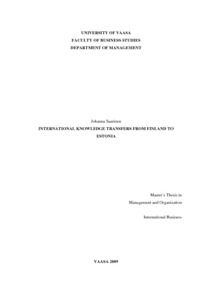International knowledge transfers from Finland to Estonia
Saarinen, Johanna (2009)
Kuvaus
Opinnäytetyö kokotekstinä PDF-muodossa.
Tiivistelmä
Knowledge transfer is one crucial element in the process of knowledge management. The competitiveness of multinational companies is based on how efficiently and effectively they are able to transfer knowledge to their foreign units. Choosing the right mechanism for the knowledge transfer is essential in order to successfully complete the transfer process. This research is aimed at exploring the mechanisms multinational companies use in transferring knowledge to their foreign affiliates, as well as the factors explaining their use, the types of knowledge transferred and the challenges encountered.
The frame of reference of this research consists of literature in knowledge management: definitions of knowledge, how to create, manage and transfer it and with what kind of mechanisms, as well as the impediments in knowledge transfers. The chosen research method was qualitative. The data was collected by conducting 10 semi-structured telephone interviews with Finnish managers of a domestic parent company, who either were on an assignment in their Estonian subsidiary at the time of the interview or had been on one shortly before it.
The main findings of the research indicate that people-based mechanisms were experienced to be the most effective methods in transferring knowledge from Finland to Estonia. Moreover, it was discovered that former socialism in Estonia still affects people’s behavior and attitudes and that was considered a challenge from a knowledge transfer perspective. The most challenges were experienced to reside in greater power distance and in people’s attitudes to change, as well as in their motivation to receive and absorb new knowledge. However, major differences were discovered between the old generation and the young generation of the Estonian employees – between those who have worked in the Soviet organizations and those who have not.
The frame of reference of this research consists of literature in knowledge management: definitions of knowledge, how to create, manage and transfer it and with what kind of mechanisms, as well as the impediments in knowledge transfers. The chosen research method was qualitative. The data was collected by conducting 10 semi-structured telephone interviews with Finnish managers of a domestic parent company, who either were on an assignment in their Estonian subsidiary at the time of the interview or had been on one shortly before it.
The main findings of the research indicate that people-based mechanisms were experienced to be the most effective methods in transferring knowledge from Finland to Estonia. Moreover, it was discovered that former socialism in Estonia still affects people’s behavior and attitudes and that was considered a challenge from a knowledge transfer perspective. The most challenges were experienced to reside in greater power distance and in people’s attitudes to change, as well as in their motivation to receive and absorb new knowledge. However, major differences were discovered between the old generation and the young generation of the Estonian employees – between those who have worked in the Soviet organizations and those who have not.
